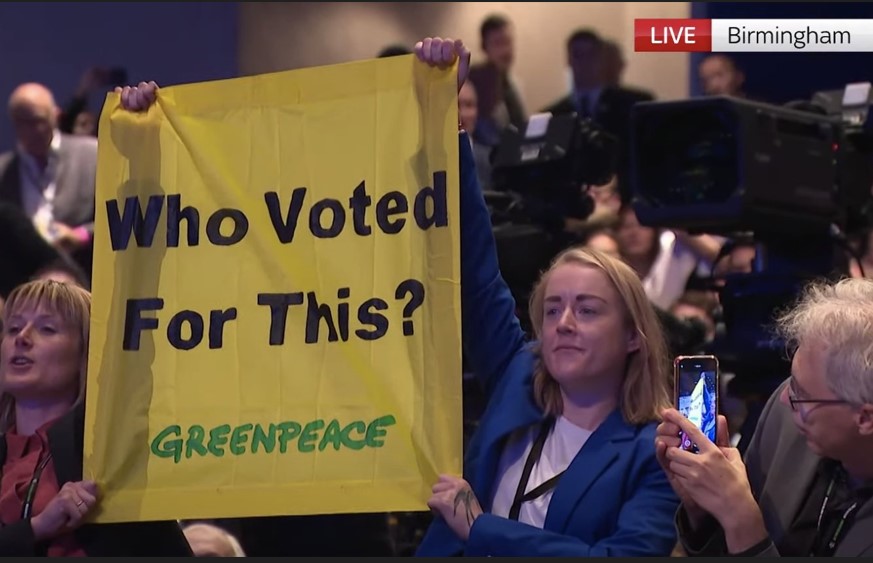
‘Stubborn Optimism’ Will Pave the Way to Climate Disaster
COP27 failed. The Sharm El-Sheikh Pact does not even mention the reduction of fossil fuel use. How can there be any hope of a meaningful plan to defuse the carbon bomb if the fuel for the bomb isn’t mentioned in this flagship climate pact?
Nevertheless, we will hear many voices in the coming weeks and months that will urge us to keep the faith, to double-down, to just try a bit harder. These voices are led by the two apostles of climate-optimism: the architect of the Paris Agreement, Christiana Figueres; and the leading contemporary writer, Rebecca Solnit. They urge upon us endless hope and forbid any despair. They call for ‘stubborn optimism’, no matter what.
However, faced with all the available evidence, stubborn realism is actually required – a stubborn insistence on addressing the reality of our situation, no matter how painful.
The hopes of the past – of delivering in full on the Paris Agreement in 2015 that Figueres brilliantly negotiated – are gone. The world hasn’t been kept safe.
At a recent event I attended with academics from across the entirety of my university’s world-leading climate studies/science community, a vote was taken: how many in the room believed that the target of curbing global warming to 1.5°C is still alive, as promised in Paris? Not a single person out of 60 said yes.
Does this mean it is time to permanently despair; to give up? Of course not. But neither is it time to double-down. It is time, rather, to let go of what is gone, to fight harder for what is still possible.
The anger, shock, sense of betrayal and the grief that we are not going to stay below 1.5°C can act as a rocket-fuel for the climate movement. It is the power that was unleashed by Extinction Rebellion, the Sunrise Movement and Greta Thunberg. It needs now to be felt and manifested by a much larger, more inclusive, more positive, more ‘moderate’, movement.
Our children are facing devastation, possibly even annihilation. That must be our fuel.
Marching Towards Disaster
What’s needed, then, is a fully truth-based approach. Indeed, the whole truth, hard though it is to face, is our salvation.
My students often express relief to me, when I say it is perfectly justified to feel desperate; that they don’t have to waste energy fending off such feelings. Only in facing the truth together (about how bad, on balance, things are; how much later in the night it is than we have been told) can we unleash the full power of our grief and anger.
These emotions are merely short-circuited while one remains in the grip of stubborn optimism, which pretends we have not lost anything.
World leaders at the G20 summit and at COP27 have, over the past fortnight, chosen fantasy over reality by claiming to recommit to staying below the critical 1.5°C maximum global over-heating target. Maintaining the pretence that 1.5°C is still alive insulates world leaders from having to admit failure.
These leaders rightly fear what the world will say when it is finally conceded that 1.5°C is dead. Meanwhile, we lose valuable time – and those in charge continue to abdicate their responsibilities. Figueres’s epochal achievement in Paris and Solnit’s inspirational thought-leadership must also not blind us to the limits of their relevance now, in the post-1.5°C world.
The thing is: you can’t insist on outcomes, as Figueres tries to do. That way lies delusion and burnout.
Stubborn optimism means insisting that we are going to achieve a certain outcome, no matter how overwhelming the odds get. Stubborn realism instead is insisting on the truth even when doing so is uncomfortable. We need to trust the public with the actual state of the world. Trust that they – that we – can handle the truth.
Our stubborn realism begins by facing the fact that 1.5°C is not alive and that we are moving into a hot new world. We will almost certainty see damaging sea level rises, losses to such vital natural habitats as coral reefs and rainforests, food shortages, forced migration, and much more.
Until these facts spread far and wide, world leaders will be able to go on mouthing vague platitudes that are designed to keep us all anaesthetised.
Ultimately, every well-intentioned activist, NGO or country that continues to claim that 1.5°C is alive is providing cover for the countries and fossil fuel companies that have killed it.
While COP27 may have made some overdue progress on providing loss and damage funds to vulnerable countries, it made less than none on greenhouse gas reduction. Without progress on the latter, these new funds will simply pay for hospitalising civilisation.
We will make no progress until the consequences of the world’s actions are admitted. Until, that is, we are willing to call out in plain language those who’ve killed 1.5°C.


